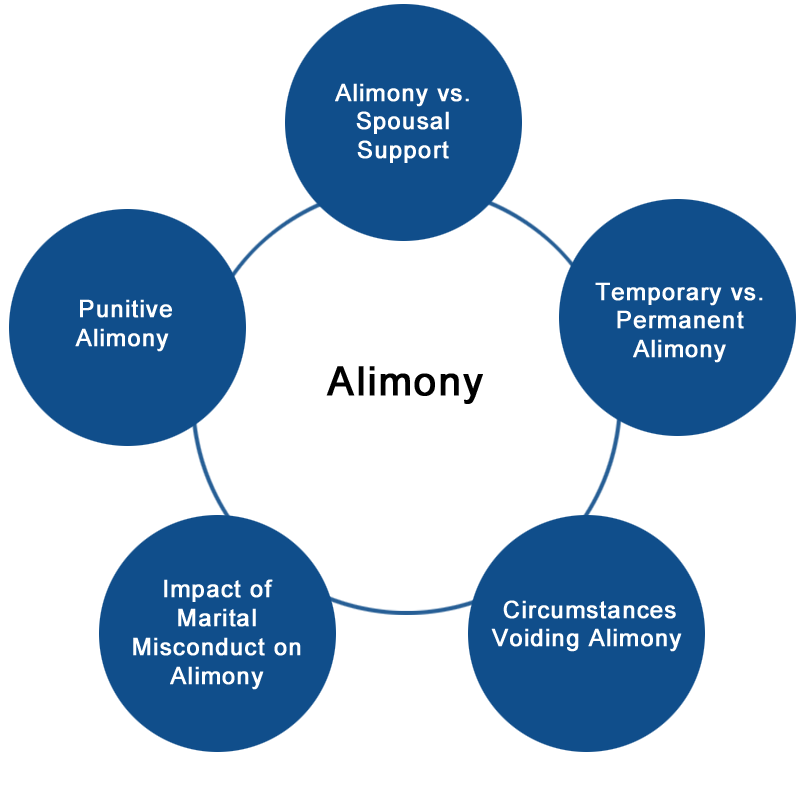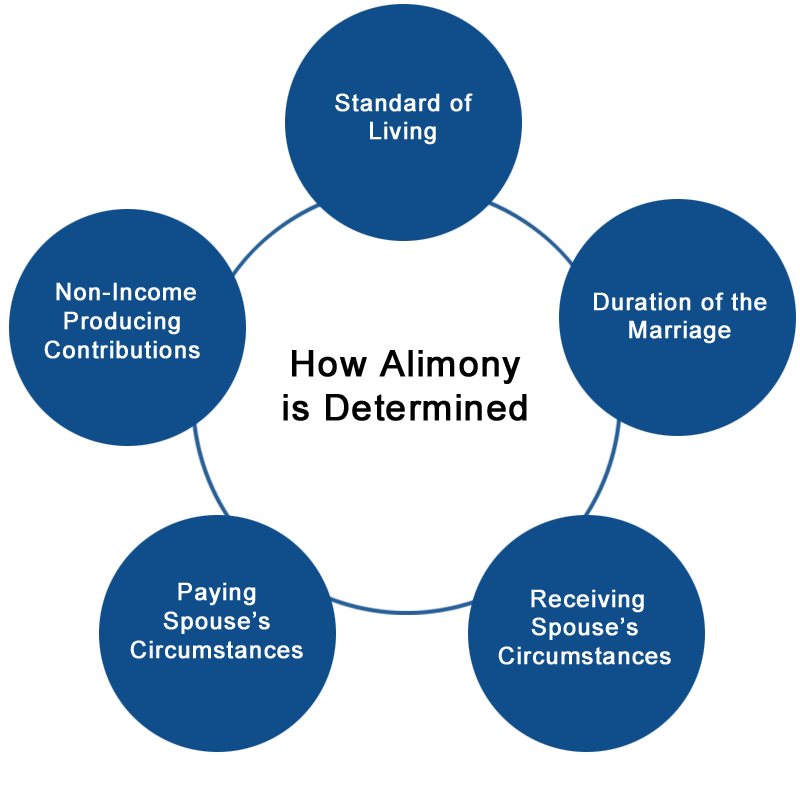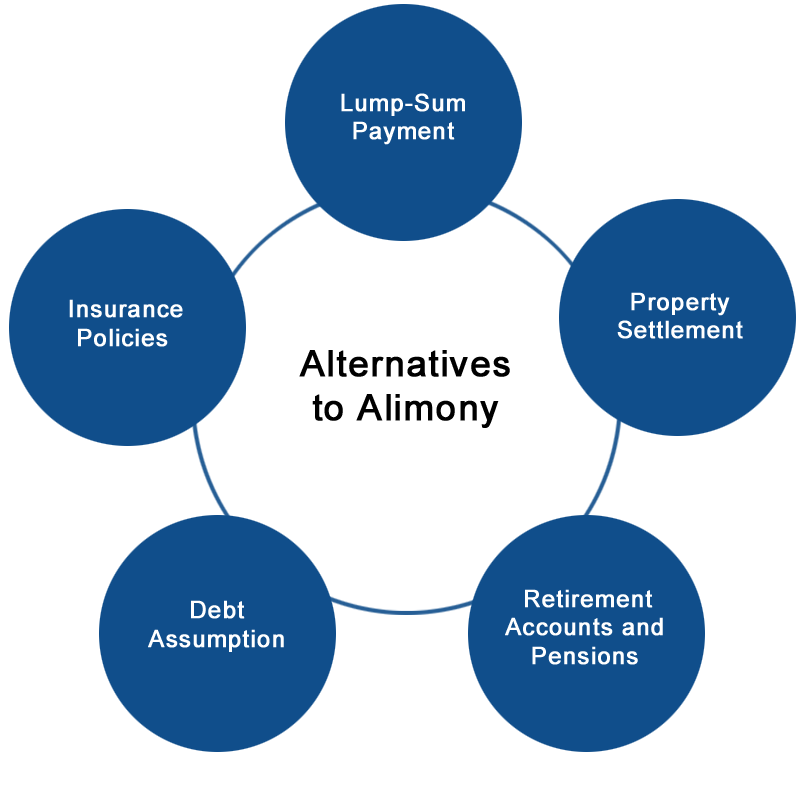
Alimony in Georgia
Following the dissolution of a marriage, alimony is typically rendered by one spouse – generally the one with the higher income – to the other spouse. This payment generally occurs monthly throughout the divorce process and beyond.
Alimony is legally distinct from child support under Georgia law. While the amount of alimony is based on several factors such as the length of the marriage and the financial status of both spouses, there is no “formula” for determining that amount. Child support, on the other hand, is clearly calculated based on guidelines established by the state, and is earmarked specifically for the costs of raising a child.
The spouse seeking alimony payments must prove their need in Georgia family court, as well as prove that their former spouse has the means to afford alimony payments. The court, following Georgia’s alimony statutes, can either grant permanent (also called non-modifiable) alimony payments or temporary (modifiable) payments that remain in effect while divorce proceedings are underway. As a divorce can take up to a year to arbitrate, this temporary alimony can be vital.
Essentially, modifiable alimony is a set of monthly payments in which the terms, duration or amount of payment can be altered due to several circumstances, such as one spouse passing away, moving in with a new partner, or remarrying. The terms of non-modifiable alimony cannot be changed and consist of either a single lump payment or a structured payment plan. While the terms cannot be changed, they can be adjusted, for example if either party’s financial situation changes.
Under certain conditions, the court may authorize the issuance of lifetime alimony. This is typically issued in cases when one spouse is unable to support themselves financially, whether due to disability or responsibilities to a child with special needs.
The spouse seeking alimony payments must prove their need in Georgia family court, as well as prove that their former spouse has the means to afford alimony payments. The court, following Georgia’s alimony statutes, can either grant permanent (also called non-modifiable) alimony payments or temporary (modifiable) payments that remain in effect while divorce proceedings are underway. As a divorce can take up to a year to arbitrate, this temporary alimony can be vital.
Essentially, modifiable alimony is a set of monthly payments in which the terms, duration or amount of payment can be altered due to several circumstances, such as one spouse passing away, moving in with a new partner, or remarrying. The terms of non-modifiable alimony cannot be changed and consist of either a single lump payment or a structured payment plan. While the terms cannot be changed, they can be adjusted, for example if either party’s financial situation changes.
Under certain conditions, the court may authorize the issuance of lifetime alimony. This is typically issued in cases when one spouse is unable to support themselves financially, whether due to disability or responsibilities to a child with special needs.
Alimony vs Spousal Support
While the terms “alimony” and “spousal support” both refer to funds paid by one spouse to another following the termination of the marriage, they are legally distinct concepts under Georgia law. While alimony describes a temporary or permanent payment structure as described above, spousal support encompasses a broader range of support. For example, spousal support could describe financial assistance given to one spouse during separation, but before the divorce is finalized. It could also describe cases where the terms are defined as part of a marital settlement agreement, rather than a court-ordered mandate.
 How Alimony Can Be Voided
How Alimony Can Be Voided
Georgia law does not guarantee alimony for either spouse as part of a divorce. In some cases, alimony can be nullified altogether by circumstances such as abandonment or adultery. In fact, state law often forbids alimony if either of those circumstances can be proven. For example, if it is proven that one spouse entered into an affair before the divorce was finalized, it is considered a breach of marital contract under Georgia law. If one spouse willingly deserts the other, it is considered a failure to uphold marital duties. Either can disqualify the offending spouse from receiving alimony payments, as their misconduct violated the core principles of a marital relationship.
Not only can these discretions nullify the payment of alimony, but they can also trigger the payment of what is known as “punitive alimony.” If the judge determines during a fault divorce that one partner has been unfaithful, abandoned their spouse, was abusive or was habitually intoxicated, they may require them to pay alimony to their former spouse as a form of punishment.
How Alimony is Determined
As Georgia law does not specifically outline any hard-and-fast formula for determining alimony, its structure is largely determined by local legal practices and the judge’s discretion. Because their judgement is ultimately subjective, this can create vast inconsistencies in the way alimony is determined. But a few key factors in determining alimony include:
Standard of Living: One of the largest factors considered in determining alimony by the state of Georgia, as elsewhere, this is a measurement of the couple’s baseline during the marriage. It encompasses everything including the value and type of their home, combined income, average expenditures, savings, investments, access to healthcare and insurance coverage, education level and overall personal health and wellness.
Duration of the Marriage: The amount of time that the couple spent married to one another prior to the divorce is a large consideration in determining alimony because it speaks to the amount of financial dependence one spouse has developed toward the other. The longer the marriage, the greater one spouse can come to depend on the other’s finances to maintain their standard of living, and thus the greater the monetary support. A length of 10 years or more will typically yield significantly larger alimony amounts.
The Receiving Spouse’s Circumstances: The judge will take into account whether the receiving spouse has the capacity to maintain their standard of living, basing their decision on factors including their age, earning potential and physical condition. If the receiving spouse is still young enough to become self-sufficient, has a greater earning potential due to their education and experience, and is in good enough health to seek employment, they may receive smaller payments for a shorter period of time.
 The Paying Spouse’s Circumstances: Likewise, the judge will base their decision partly on their determination of the paying spouse’s ability to make alimony payments without suffering undue hardship. This will be based on factors such as their earning capacity (not just what they currently earn, but what they could), financial situation (including income, assets and property), and outstanding debts. This allows the judge to find a fair alimony situation that doesn’t compromise the paying spouse’s ability to maintain their standard of living.
The Paying Spouse’s Circumstances: Likewise, the judge will base their decision partly on their determination of the paying spouse’s ability to make alimony payments without suffering undue hardship. This will be based on factors such as their earning capacity (not just what they currently earn, but what they could), financial situation (including income, assets and property), and outstanding debts. This allows the judge to find a fair alimony situation that doesn’t compromise the paying spouse’s ability to maintain their standard of living.
Non-Income Producing Contributions: This category gives a judge the ability to weigh an alimony decision on more intangible factors within a marriage, rather than simply relying on the dollars and cents. Non-income producing contributions run the gamut, from the amount each person contributed to maintaining the home and raising children, whether one made career sacrifices for the sake of the marriage, the type of emotional support each provided to the other, and what role each played in their community and social circles.
That subjectivity is why effective legal representation is so important in divorce cases. To present a compelling case for or against alimony, an attorney needs to create a compelling argument, gather evidence to support that argument, and negotiate monetary settlements. Working through an attorney and a mediator, it is possible for both spouses to come to an agreement on alimony without the court, giving them both a greater say in their fate. Whichever route you take, it’s crucial to have an attorney you can trust to create a compelling narrative and an effective strategy.
Deciding Your Own Alimony Agreement
Georgia law requires that any couple seeking divorce first go through mediation, in which both spouses meet with a neutral party to discuss different aspects of the divorce, including alimony. Rather than leave the terms of their alimony in the hands of a judge, the couple can come to an agreement during mediation on the terms of the alimony. These terms are then written into the separation agreement and become part of the official court order.
This self-determination can be beneficial to everyone involved. Not only is it faster, less stressful and cheaper than having alimony determined during court hearings, it gives both parties a greater degree of control over the outcome. In cases where children are involved, this collaborative negotiation can be beneficial for maintaining a relationship as co-parents.
It’s important to note that none of these terms are permanent. If one party’s financial situation changes to the point that alimony needs to be adjusted or stopped, the terms can be challenged or changed by the court.
Alternatives to Alimony
Alimony is not the only avenue during a divorce, and it may not always be the best solution for meeting the needs of both parties. There are several different alternatives that might suit the situation better, including:
Lump-Sum Payment: Rather than spreading out alimony through a series of payments, one party may simply pay the other a one-time lump sum, simplifying their financial ties and allowing for immediate use of funds.
Property Settlement: In lieu of cash alimony payments, the paying party may choose to substitute a transfer of ownership for high-value items such as real estate, investments or vehicles. This can be useful in keeping property within the family.
Retirement Accounts and Pensions: Essentially, this means splitting access to retirement accounts or pensions to ensure continued support for both parties. This may require using a Qualified Domestic Relations Order (QDRO) to avoid penalties in dividing retirement assets.
Debt Assumption: Rather than assume payment of alimony, one party may offer to take on a greater portion (or all) of the total marital debt.
 Insurance Policies: In certain cases, provisions can be written into life or health insurance policies to allow for long-term financial security for the spouse who would otherwise receive alimony.
Insurance Policies: In certain cases, provisions can be written into life or health insurance policies to allow for long-term financial security for the spouse who would otherwise receive alimony.
Educational Support: If the receiving spouse is pursuing higher education to increase their own earning potential, the paying spouse could fund their educational expenses in lieu of alimony.
Trust Funds: Another alternative to alimony would be the establishment of a trust fund in the name of either the receiving spouse or the children, giving them a controlled means of financial support.
Protecting Yourself from Paying Alimony
It can be a challenge to avoid having to pay alimony, particularly following the dissolution of longer marriages, but there are several strategies that have proven effective.
Pre- or Post-Nuptial Agreements: Written either before or during the marriage, this contract clearly spells out the terms of the divorce before it happens, letting you determine exactly what the alimony situation will be.
Document Financial Contributions: The more financial contributions to the marriage that you can prove, the greater the influence on the final alimony decision.
Encourage Spousal Self-Sufficiency: Supporting your spouse’s career and elevating their earning potential puts them on greater financial footing, reducing the burden you’ll be required to carry.
Mutual Agreement: While this must be approved by the court, both parties can define their own terms of the divorce, including waiving alimony payments.
Alimony FAQs
Q: What are the biggest factors in determining alimony?
A: While the terms of alimony are left to the judge’s discretion if they are not resolved during mediation, there are several ground rules that apply. First, the judge will consider any marital misconduct, e.g. adultery or desert. Second, they will examine the financial situation of both parties to determine the need and ability to pay. Third, they will factor in the duration of the marriage and the standard of living both parties enjoyed. Finally, they will consider the age, health, mental state and career of both parties to gauge future earning capacity.
Q: How long does spousal support typically last?
A: There is no hard and fast answer to this question, as the duration of spousal support varies from case to case. It can also vary by the type of post-divorce alimony. Rehabilitative alimony gives the receiving spouse a set period in which to gain employment or further their education. Permanent alimony can be applied when the receiving spouse lacks the ability to be self-sufficient owing to health or age. And a lump sum alimony is paid out immediately.
Q: Is it possible to lose alimony support?
A: Yes. When there are significant changes in the circumstances of the receiving spouse, the court may reevaluate the alimony structure and adjust accordingly. These changes can be financial such as a change in employment status or increase in income, or changes in life situation, such as entering into a long-term relationship or remarrying.
 The Claiborne Firm Difference
The Claiborne Firm Difference
At the Claiborne firm, we take a meticulous approach to representing you in divorce proceedings. Our attorneys exhaustively gather evidence, create proactive strategies and get out in front of any challenges to craft a compelling case of ironclad arguments and facts. We build the relationship with our clients, we dig deeper into the facts and we develop knowledge of your case that consistently leads to favorable outcomes.
Just look at our track record. In one case, a client reached out after a judge had ruled in favor of a five-year agreement in which they had received zero alimony. Even though the case was over, we listened to her side of the story and found an error in the case that had been presented to the judge. We were able to successfully argue that the error had impacted the final verdict, and were able to get the case reopened and re-adjudicated. We were then able to settle the case with our client receiving more than a million dollars in alimony to be paid out over the next several years.
In another case, we represented a client who had become disabled during the first year of what would be a four-year marriage. Even though the typical minimum length of a marriage is seven years to qualify for alimony, we stood by her side in pursuit of alimony that would help her deal with her disability. Our conviction paid off when the client was awarded lifetime alimony.
Whether you are the paying or receiving spouse, we can help you achieve the favorable outcome you deserve. It all begins with a $450 initial consultation, in which we confidentially establish the facts of our case through notes and evidence, developing our understanding of the case and crafting our strategy. At this consultation, we will also establish our retainer fee, taking the guesswork out of your divorce and ensuring you only pay what you need.
We understand the laws surrounding divorce and alimony in Georgia, and we can put that knowledge to work for you. Submit your contact information below to schedule your initial consultation.
Call (912) 351-8775 or Schedule a Free Case Evaluation Online
